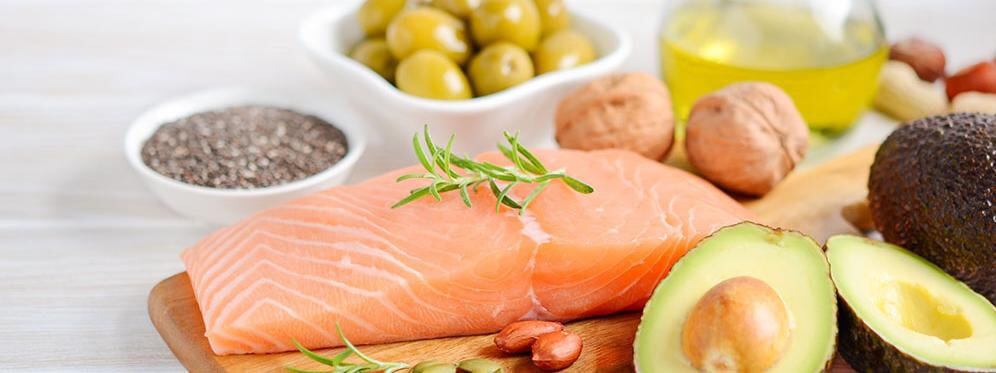- Tue, 10/13/2020 - 15:46
- Let's talk about fats
- by IMI health
Fats. Are they bad for you?
When we think about fats, usually certain things spring to mind. Cheeseburgers, takeaways and all things deep fried: essentially everything you want to avoid if your intention is to live a long, healthy life. However, there are some fats which are crucial for our minds and bodies.
Omega oils can boost our brainpower, lift our mood and ease joint pain, helping us move through life freely and easily. [2,3,4]
There are three categories of omegas: 3, 6 and 9. Omega 3 is famous for its health benefits and while omega 6 is infamous (often for all the wrong reasons) in health conscious communities, you need adequate levels of both for your body to function properly. Omega 9 fats are also beneficial, but non-essential as we can make the fatty acids they contain ourselves.
Like its cousin omega 3, omega 6 helps nourish cardiovascular health. Though certain levels of omega 6 are essential, they must be balanced against omega 3 intake and be consumed from healthy sources (coconut oil, walnuts) rather than unhealthy sources (crisps). Expert opinions differ on the optimum ratio, from 1:1 to 5:1. A shocking statistic suggests that most western diets contain 50 times the amount of omega 6 when compared to omega 3 intake. [5]
Omega 6 fats have a bad reputation, blamed as the cause for cardiovascular issues, however new research has debunked these theories. The American Heart Association found that reported side effects of omega 6s weren't correct and other research has verified that they actually boost our cardiovascular health. [6, 7]
Though we can always reduce our intake of processed foods, like crisps, there’s no need to fear omega 6s. Instead, we can work to find an equilibrium by boosting our omega 3 intake, bringing the two into balance.
The three musketeers of Omega 3
The three common omega 3 fatty acids are DHA (docosahexaenoic acid) EPA (eicosapentaenoic acid) and ALA (alpha-linolenic acid).
DHA is a major component of the grey matter in our brain, explaining the profound impact it has on our cognitive function. Good for both your heart and you head, DHA is thought to be the best fatty acid for improving several indicators of heart health. [8, 9]
EPA may help stabilise blood pressure, and cholesterol.* [11,12]
It is also a crucial nutrient for mental health, and believed to be the most effective in alleviating symptoms of depression. With its hydrating qualities, EPA should be your go-to for radiant skin. [13,14]
Found in superfoods, like chia seeds, ALA is a great source of omega 3 and a powerful antioxidant. It may assist in stabilising blood sugar levels,* as well as promoting healthy heart, skin and nerve function. [15,16,17,18]
Many vegetarians choose ALA as an omega 3 supplement as it is converted into DHA and EPA (the two most important omega 3 fatty acids) by our bodies, however large amounts are required in order to produce satisfactory amounts of DHA. Depending on age, weight and gender, this process is slow and inefficient. Many vegetarians have a low intake of DHA and EPA while vegans are found to consume almost none. The most effective way for vegetarians to supplement DHA and EPA is by taking an algae based omega oil- the original source of these fatty acids. [19]
Our greatest natural resources of omega 3 are found in fatty fish which feed on the algae, rich in DHA and EPA. But with mercury making its way into these reserves, it's understandable that people aren't rushing to supplement omega 3 with farmed fish full of toxins. And though it is possible to obtain enough ALA in a vegetarian diet for it to be converted into enough DHA and EPA, it's not likely. The easy and effective way to ensure you’re getting enough omega 3 is to supplement- however, quality is key.
Finding a quality oil
When it comes to fish oils, you get what your investment is worth. Omega 3 supplements are delicate, and without proper handling they can go bad, fast.
Research is an important stage before buying any supplement, but when it comes to fish oil, it's vital. Find products that have been tested by external bodies to validate the DHA and EPA contents claimed on the label. It's also important to look for an adequate concentration- at least 60% of your fish oil should be omega 3.
Always buy from a reputable brand that cares about the quality of their product, rather than those who are churning oils out purely for profit. Oils that aren't processed properly can contain the heavy metals you're trying to avoid by turning to a supplement. They may also contain contaminants like PCBs or dioxins, which are toxic chemicals.
Cheaper fish oils will not improve your concentration, or ease your joints, in fact, they're most likely to go rancid and cause health issues, defeating their purpose entirely. [20]
Fish oil supplements go rancid when they’re subject to oxidation, which can be caused by improper packaging or storage. Temperature and exposure to light and oxygen are key factors- look for opaque or dark packaging, oils that are found in capsules, or liquids that are kept under temperature control.
Be aware of unregulated products or counterfeits, touted by untrustworthy sellers online- if the price seems too good to be true, it is. Buy from brands you trust, and don't be afraid of investing time and money on quality nutrition.
If it seems complex, don't worry, you're not alone in your quest for a quality omega oil! Here at IMI, our practitioners have selected only the most pure fish oils, to ensure that the best of the bunch are available to you at the click of a button. We have used our range of oils with regularity to improve our clients' quality of life- and with great results. Our clinical grade oils have undergone independent testing for purity, and we take pride in ensuring they are stored carefully, to ensure their quality.







